
Many tabletop role-playing enthusiasts had to make big changes to their playstyles in 2020. Whether it meant suspending long-running games, moving to virtual play sessions, or playing more with those they lived with, it’s been a challenging time to get a fix of that dice-rolling goodness. Regardless, there was no shortage of wonderful new RPG books, expansions, boxed sets, and full games over recent months.
Whether you’ve got a way to play right now, or you just want to read up and learn some great games ahead of when the pandemic is all over, here are some of the absolute best role-playing game releases of 2020.

BFF! – Best Friends Forever
Publisher: Heart of the Deernicorn
If the game BFF could have a middle name, it would Charming. This lovely GM-free role-playing game challenges players to take on the role of tween girls as they navigate friendship, moments of discovery, and the small quiet moments that shape our emotional selves when we’re young. Brought to life through playful standee characters that represent your characters, and further enhanced through a book of illustrated locales the girls can visit, this is a quiet, easy-to-learn game that is a perfect fit for young players, but grown-ups can also uncover a lovely throwback to the silly and sometimes poignant moments that unfold in pre-adult life.
While BFF is undoubtedly a role-playing game, it succeeds for how very different it is from almost any other game you have likely played. This isn’t an experience about monster slaying or leveling up. Instead, you’ll do things like select charms to give to your friends, and then narrate why you chose that particular item. You might talk through the snacks you’re enjoying at the slumber party, or detail the way you cemented your friendship that one day at your beach hangout.
Vibrant in both theme and art, BFF! – Best Friends Forever includes numerous card prompts, hangout maps (contained within a guidebook), and other components to help fuel your adventure. But it’s ultimately the wholesome and emergent stories you craft together that hit on one of the core dynamics of role-playing games – the way that the developing relationships amid a party of characters in a game can, in turn, fuel the development of real-life friendships and memories.
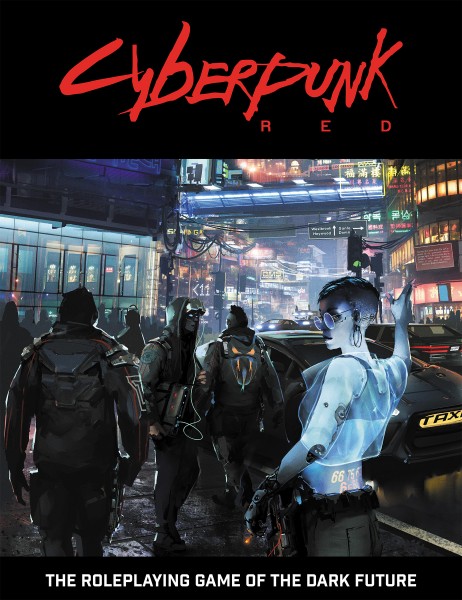
Cyberpunk Red
Publisher: R. Talsorian Games
Long before CDPR’s video game arrived on the scene, Cyberpunk lived for decades as a tabletop role-playing game. The latest edition is a thoughtfully crafted RPG that requires zero previous experience with the franchise, and offers a perfect gateway into this dark and dystopian future.
Cyberpunk Red sits in the fictional timeline between the older editions, like Cyberpunk 2020, and the new video game set in 2077. Within those decades of history, players will find the same morally ambiguous conflicts, mind-twisting netrunning, and explosive battles that characterize the best of the cyberpunk genre. Many of the rules are flexible, allowing you to dip your toes into various systems to whatever degree you want. For instance, a smartly balanced combat system can be handled with incredible ease using the core rules, but there’s plenty of extra depth to dig into if giant street wars are going to be at the heart of your campaign. The cyberware aspect of gameplay is especially nuanced, exploring issues around what makes us human, and the tension between upgrades and holding on to the empathy and soul of the flesh.
The full-color core rulebook is especially inviting and beautiful, mixing in-fiction anecdotes, ads, and flavor seamlessly with the nuts and bolts of gameplay, all alongside some evocative art that helps to bring the weapons, characters, and locations to life. There’s also a wealth of world-building and history packed inside, revealing the breadth of depth of a fiction that has been carefully crafted over multiple years and editions.
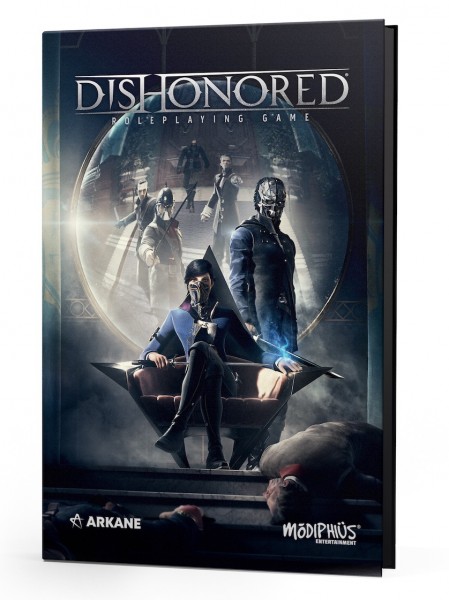
Dishonored Roleplaying Game
Publisher: Modiphius
Anyone who played either of Arkane Studios’ Dishonored video games can tell you; the weight of history and fiction grounded the video games, and helped them to feel authentic and engaging. It always felt like there were hundreds of additional stories that could be told in this world. Emerging to answer that need, the Dishonored tabletop game gives you the tools to once again enter that world, and explore its many dark and infested corners.
Modiphius has spent years refining and creating options for its proprietary 2d20 system, adapting it to suit the needs of a variety of settings and styles of play. For Dishonored, the focus is on a streamlined and action-packed version, where story is placed front and center.
The hardcover digest-style book packs a ton of content into its 300 pages, including a wealth of worldbuilding for anyone who always wanted a more codified place to read about the Dishonored world and the myriad conflicts playing out on its islands. The game ably supports playstyles that match the assassin vibes encountered in the video games, but there’s also plenty of other directions you can go, from palace intrigue to sprawling campaigns of exploration. In addition, the system handles the occult and mystical elements of this universe with great skill, giving players the ability to warp reality to further their ends. The Dishonored Roleplaying Game is a lovely gift to anyone who hungered for more of this shadowy and richly drawn world, with a system that is more than up to the challenge of bringing it to life at your table.
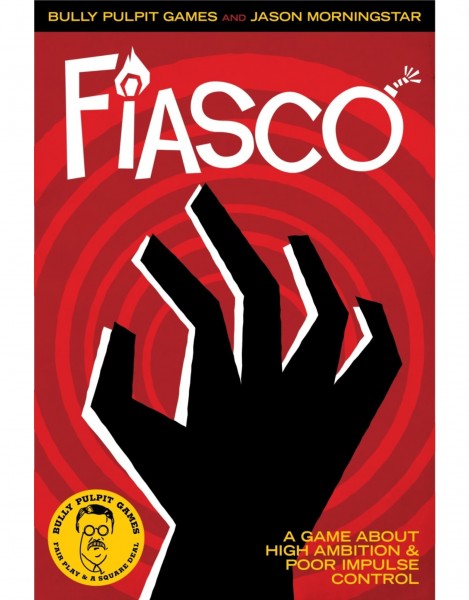
Fiasco
Publisher: Bully Pulpit Games
The original Fiasco has been around for over a decade, offering incredible opportunities for storytelling and laughter with friends. A new edition rolled out to retail earlier this year, maintaining all the drama and disasters inherent to the original, but with a new card-based formula that is easier to learn and faster to play.
Like the original, the new boxed set is a GM-less RPG for three to five players, in which the players enact an unusual scenario that usually ends badly for most involved. Structurally, the stories are very similar to a Cohen Brothers film, like O Brother Where Art Thou?, or Fargo. Everyone plays out scenes that gradually build up tension and dark humor, before a “tilt” in the story offers a crazy twist that sets everyone crashing toward an often wild conclusion.
The new version is beginner-friendly thanks to its use of cards instead of the dice and index cards of the older version. Fiasco is a great time for anyone who is up for a little improvisation; the game does a stellar job of showing how embracing a characters’ failures are often the best way to “win” an RPG.
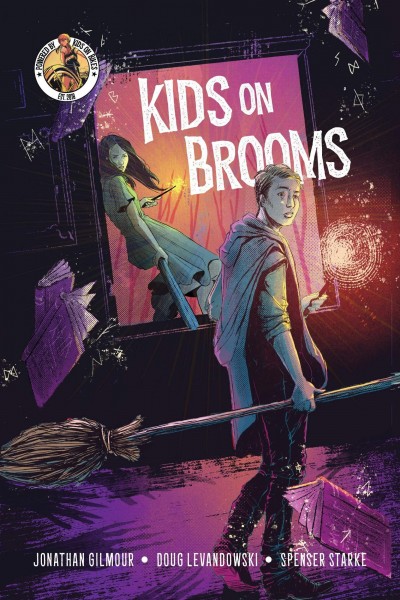
Kids on Brooms
Publisher: Hunter Entertainment/Renegade Game Studios
Kids on Bikes won a spot on this list back in 2018, and that game remains an awesome way to bring life to stories about young people on adventures as they come of age. But if your particular preferred flavor of adolescent hijinks includes schools of magic, broom flying, and the learning of magic, then this is the game for you. To put it another way, this is a Harry Potter RPG in all things but name and license.
Like Kids on Bikes, Kids on Brooms puts a lot of control and power in the hands of the player to craft their own setting. In fact, the game gets going in the first session by letting the players work together to name and shape the magical school the characters will attend. From there, the rules are mechanically light, providing clear tools to govern the nature of your magic-using hero, and how they can confront the challenges they’ll encounter.
While its straightforward rules make this game an ideal choice for anyone who loves stories of wizards and witches, experienced gaming groups that like to have a more communal approach to worldbuilding will be especially enchanted.
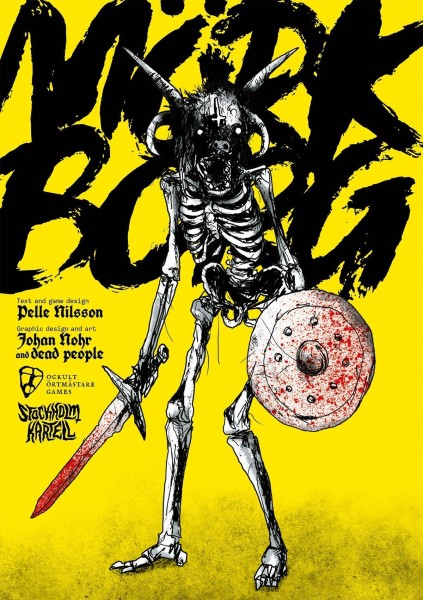
MÖRK BORG
Publisher: Free League Publishing
If you think that rules-light role-playing games equate to a less hardcore vibe, then let me introduce you to the apocalyptic death-metal world of MÖRK BORG. Decidedly adult in both its content and presentation, the game presents just barely enough rules to get by, offering up explanations for character creation, combat, and magic – but leaving plenty of room for interpretation.
The meat of MÖRK BORG is its profoundly bleak style and presentation, with engrossing (and sometimes gross) art that lays out a fantasy world falling into ruin, terror, and its own demise. Part of the OSR (Old-School Revival) genre of games that recall the earliest days of the D&D hobby, plenty of control is left to the game master to shape the structure of the game and moment-to-moment play. But ultimately, you’re controlling doomed characters, for whom certain death is perhaps one of the less brutal things that might come for them.
The book is heavy on flavor, and perversely beautiful in both its art and typesetting. But even the book might not survive the experience. In one section, players are told to roll a d20 to determine a backstory element of the story, or simply “throw a knife at the page to the right.” The game also actually tracks reality’s passage to its own horrific conclusion, and on a bad roll, the seventh seal is broken, and “the game and your lives end here. Burn the book.” MÖRK BORG is a bleak but fascinating twist on expectation, and a perfect fit for gaming groups who don’t mind a trek into the decidedly dark side of narrative.
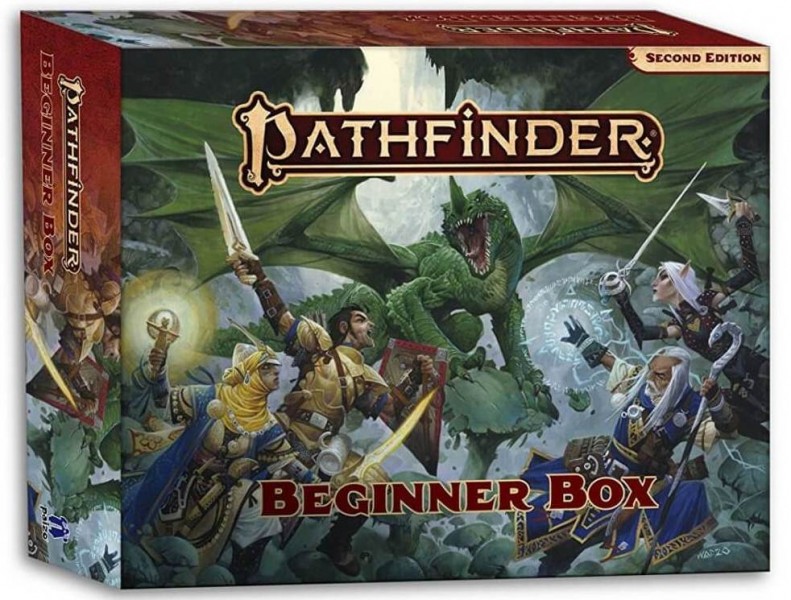
Pathfinder Second Edition: Beginner Box
Publisher: Paizo
Paizo never fails to prioritize high production values and clear rules presentations in its products, and the new edition of the Beginner Box for the publisher’s flagship game is no exception. Pathfinder is a deep and rewarding offshoot from an older variation of the D&D game, but in the many years since it splintered away, the game has shaped its own identity, which prioritizes character customization and mechanical depth. Thankfully, excellent products like this Beginner Box break down much of that complexity, and offer a sure and steady on-ramp to new players.
Pathfinder has long leaned on a set of iconic characters, with art and archetypes that make it easy to grasp the fantasy being presented. Several of those characters once again take center stage in this boxed set, filling the role of pre-gen character sheets that let groups get into the action quickly. But the Beginner Box also includes blank sheets for when you’re ready to graduate to making your own heroes. Cardboard standees, an included dry-erase grid map for the included adventure, color-coded dice, and player reference cards are all there to help ease the learning process and get you going quickly.
Separate dedicated books for players and the GM do an admirable job of breaking down the rules in an understandable format, but without oversimplifying. Because of that, you won’t feel like you’re starting over when you inevitably graduate to the full core rulebook. The new edition of Pathfinder is immensely rewarding for player groups who want some additional flexibility in their fantasy RPGs, and this Beginner Box is the perfect way to ease your way into the action.
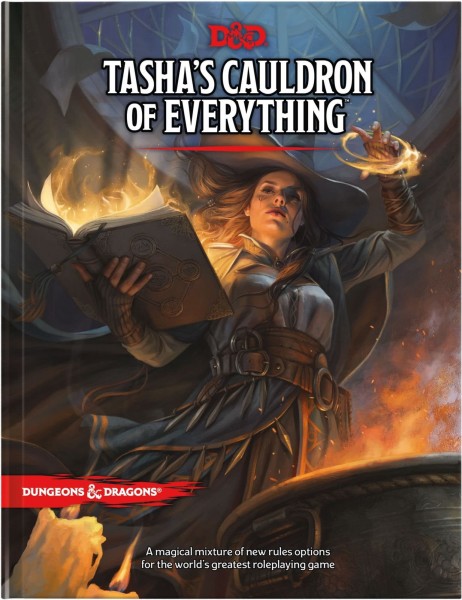
Tasha’s Cauldron of Everything
Publisher: Wizards of the Coast
The world’s original and most well-known role-playing game had several excellent product releases in 2020. But nothing else offers so many meaningful options and new directions for the D&D game like Tasha’s Cauldron of Everything.
Drawing its name from a character and laughter-inducing spell that has been part of the game for decades, Tasha’s sourcebook is mostly built as a collection of optional rules. In some cases, variations of some of the content has appeared in other products. But the vast bulk of the content is rewarding and new, and the book acts as one of the most substantial official expansions to the ruleset since 5th edition launched.
There’s a lot to uncover, but some of the most interesting options include a bounty of new subclasses for players, details on using group patrons to guide the direction of the party and campaign, new spells, magic tattoos, and even a collection of pre-built puzzles that DMs can drop directly into an adventure. The game also includes a variation of the clever sidekick system first introduced in the Essentials Kit, which is a boon to play groups that involve a DM and a single player. Also of particular note, this book does a lot to offer choices that diverge from the longstanding racial archetypes that have so long defined the game’s approach to players of different species.
While Tasha’s Cauldron of Everything is a hodgepodge, it’s a hugely flexible one that gives a ton of new options to gaming groups. While it doesn’t cross the threshold of being a new core book for 5th edition, it nonetheless represents one of the biggest and best additions to the game in years.
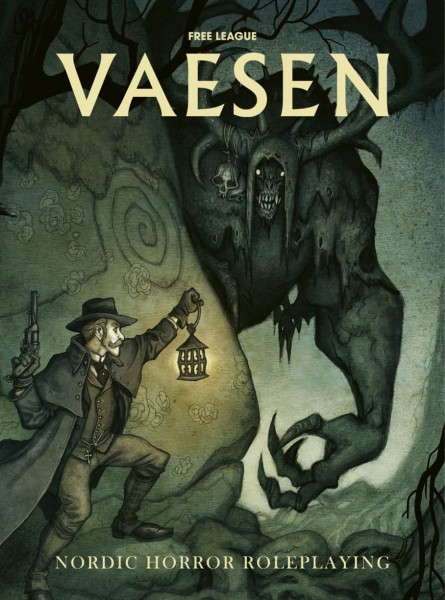
Vaesen
Publisher: Free League Publishing
For a change of pace from the familiar dungeon crawls and fantasies of more familiar role-playing adventures, you can’t go wrong with Vaesen. Inspired by and based on the Swedish illustrator and author Johan Egerkrans, Vaesen is a striking portrayal of a mythic twist on 19th century Scandinavia.
Players adopt the role of supernatural investigators who have gained the ability to see what others cannot – the strange and often invisible creatures like trolls, werewolves, and other beings that often plague humanity. Vaesen uses its horrific creatures and terrifying encounters to explore themes about the tension between nature and industrialization, but there’s also often disturbing ideas at play about the monsters hiding within individuals, lurking in the dark corners of our psyches.
Vaesen uses a new variant of the Year Zero engine that has been so successful in games like Mutant Year Zero, Forbidden Lands, and Tales from the Loop. The system deserves the praise that is often heaped on it, as it focuses on player-driven narrative, connections between characters, and conflict resolution that is easy to complete but offers meaningful resolutions and story progression. Plus, thanks to the included art of the illustrator whose work inspired the game, this is quite simply one of the prettiest role-playing game books on the market.
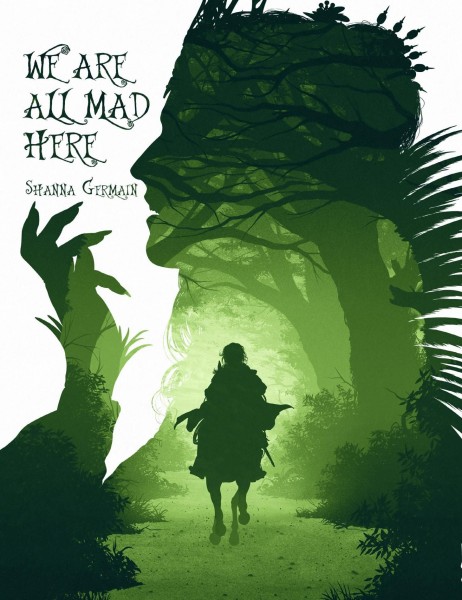
We Are All Mad Here
Publisher: Monte Cook Games
Players have no shortage of fantasy RPGs to choose from, but many cater to a classic novelistic understanding of that genre. What of the fairy tales that so frequently acted as testbeds for fantasy storytelling? We Are All Mad Here is a supplement to the excellent Cypher System Rulebook, which is required to play. With both books in hand, you can hop in to tell your own fairy tales, reenacting familiar stories like Rumpelstiltskin or Hansel and Gretel, or charting your own course.
Beyond some breathtaking art that helps to inspire the scenes you’ll be playing out, We Are All Mad Here does an especially admirable job of tweaking the existing (and excellent) Cypher system ruleset to match the unique needs of a fairy tale story. Of even greater import, the book manages to understand and clearly communicate the narrative frameworks, character types, and themes that pervade fairy tales, and how a gaming group can bring those elements to life at the table. Role-players who are interested in the theory and the craft behind setting creation and genre matching are sure to find a wealth of detail here.
Beyond theory, We Are All Mad Here also includes several ready-made options for fairy tale adventures, and a full setting of its own that you can adopt and explore in your home games, filled with plenty of hooks and characters that recall classic fairy tale setups. If your group is hungry for some whimsy and childlike magic as a departure from the standard fantasy fare, We Are All Mad Here may be just the ticket.
What RPGs have you been excited about this year? Share your selections in the comments below. And if you’re interested in some other wonderful tabletop games from this year, check out The Best Board Games of 2020. For even more great tabletop options, explore last year’s Best Tabletop and Best RPG lists. And if you’re still eager to explore more about the tabletop hobby, dive into our full Top of the Table hub from the banner below. Here’s to lots of wonderful gaming in 2021!
Read full Post here

No comments:
Post a Comment